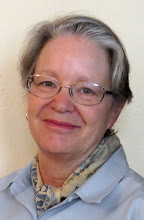Monday, April 03, 2006
Subscribe to:
Post Comments (Atom)
An improvisation based on the Book of Psalms using inclusive language and incorporating the modern lenses of ecological awareness, Taoist sensibilites, and post-modern theology.
The Book of Psalms is one of the most beloved of the prayer books of humanity, and with good reason. Its 150 chapters cover a multitude of spiritual moods and issues and is a foundation of Christian spirituality.
I've worked with the Book of Psalms periodically over the years in my own meditation and prayer, but always with mixed emotions, because, for all its beauty and wisdom, the Book of Psalms has limits which I found off-putting.
First of all, it is a book of its patriarchal faith; assuming the masculinity of God, the world's rulers, and the reader. As a woman who knows to her core that the mystery of God is both and neither male and female, this was a brick wall for me. There are some inclusive language translations of the Psalms; this is another.
Secondly, it is a book that speaks to a people living in a threatened monarchy. I, on the other hand, live in a threatening democracy. I need to be confronted with God's will for my nation with a slightly different slant.
Thirdly, the Book of Psalms is bound in the science of its time. Now that we know more about the universe and its continuing creation, our Psalms can be adapted to that knowledge.
Fourthly, the Book of Psalms is of uneven spiritual content. It sometimes devolves into violent, furious images of the divine which I just can't cope with. Many users of the Psalms psychologize these passages. (Haven't we all been so angry at times as to want to dash someone's children on rocks? Well, actually, no. But you get the idea.) In this improvisation, I've withdrawn the human projections on the divine and owned up to my own feelings.
Fifthly and for me, the most important, the writers of the Psalms lived in a world that took the existence of God utterly for granted. The Psalm writers often lament the absence of this God from their lives, but they never doubt that there is a God who could be present. In our postmodern world, even those who have taken that leap of faith know that that is what we have done, and many people stand on the brink, wondering how to get across at all. In this context, the off-hand certainty of the Psalms is not helpful. I set about to improvise with the modern theologies of agnosticism, atheism, and process theology to make the Psalms more useful to me.
These improvisations of the Psalms were the result of three years of daily spiritual practice, now several years ago. To improvise is to use a theme in a way that is recognizible but fresh. I hope I have achieved that.
I started posting these Psalms to a Blog more as a private way to explore the world of Blogging than to make them public, indeed, I posted the first several before I understood that anyone but me would ever see them "in print." Several times I lost interest in the project of posting them (Poetry is hard in blogs, as all indents have to be put in individually with HTML code in every blogging tool I've found so far.) Each time I slacked off, someone asked for more or asked permission to use one and got me going again. So what started as a spiritual discipline turned out to be useful to others, and I'm glad.
These days the blog gets about thirty hits a day, mostly from people searching Google for Psalms; I was touched to discover that I got my most hits on the fifth anniversary of 9/11.
So thanks to the faithful readers who kept me going! It was a blessing to me to re-visit the Psalms, as it had been a blessing to work and pray with them in the first place.
I share them with the prayer that they might speak to other people of faith--and doubt-- and enrich their lives and experience of the divine.
Christine Robinson

No comments:
Post a Comment